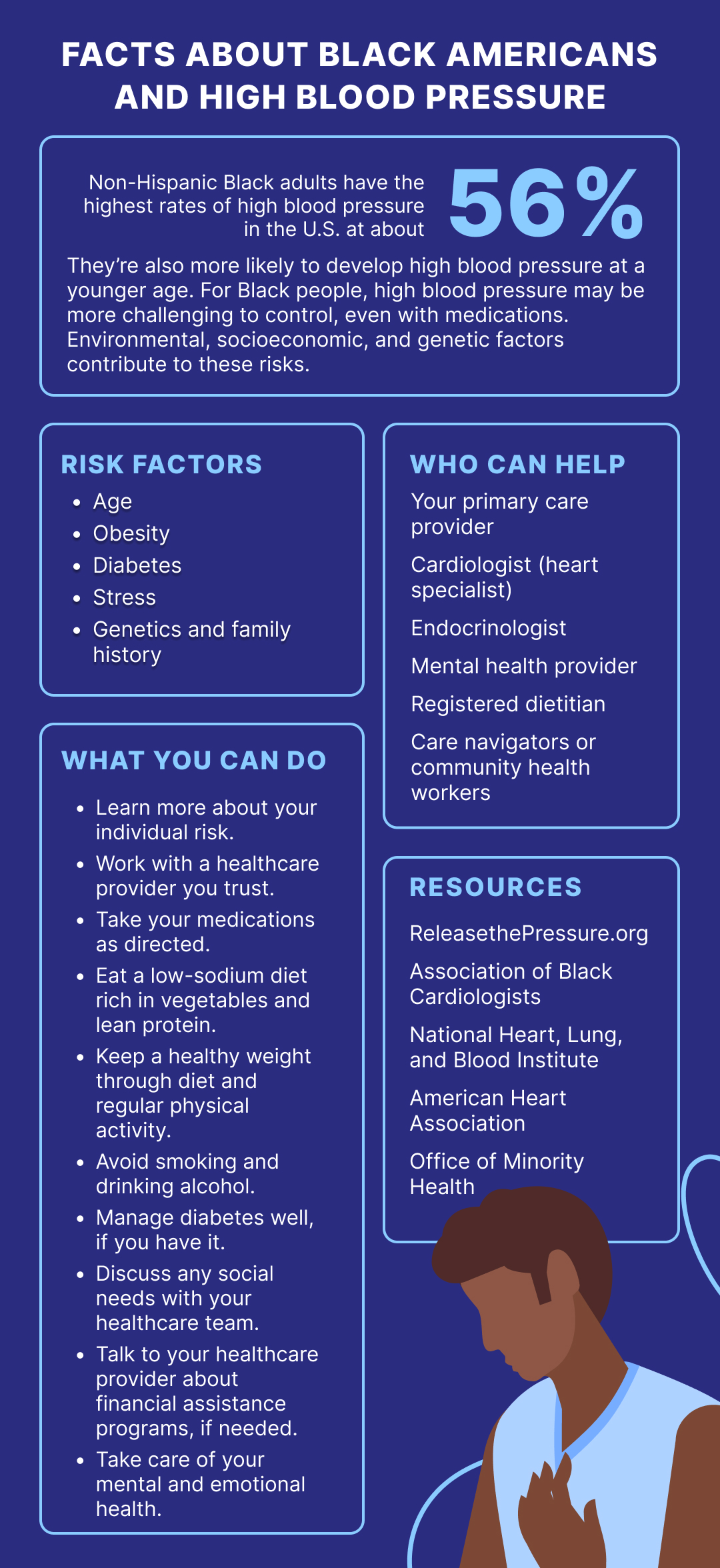Black Americans and Hypertension: What to Know

Black adults are more likely to develop hypertension (high blood pressure) than any other group in the U.S.
High blood pressure increases the risk of heart failure, stroke, kidney disease, and death, so managing your blood pressure is important for your health and longevity.
Here’s what to know to help reduce your risk of high blood pressure or help manage high blood pressure if you have it.
1. Your High Blood Pressure Risks Are Higher Than Average
About 56% of Black adults in the U.S. have high blood pressure, compared to about 47% of white and Asian adults and 39% of Hispanic/Latino adults.
Besides having higher rates of the condition, Black people tend to develop high blood pressure at an earlier age than white people do. And among Black people whose doctors have prescribed medication for blood pressure management, blood pressure control is only about 25%.
Many factors contribute to the higher risks of hypertension among the Black American population, including genetic, environmental, and socioeconomic factors.
2. You Can Help Decrease Your Risks
There are some risk factors you can’t change, such as age, genetics, and family health history. Other factors are difficult to change. For example, people in some areas don’t have ways to access healthy, whole foods or safe outdoor spaces for physical activity.
Discrimination, racism, and other historical inequalities contribute, too. Research is ongoing to determine the relationship between genetics, environment, stress, racism, and other disparities in hypertension. Greater policy work is needed to address the drivers of health disparities, too.
That said, it’s important to take charge of your health in the ways that you can. Because you may be at higher risk for high blood pressure, it’s important to learn about what factors increase your risk and to decrease the factors you can affect.
Two major risk factors are having diabetes and being overweight:
Diabetes can often cause high blood pressure, and Black people are disproportionately affected by diabetes. Talk to your healthcare provider about getting tested and follow all recommendations for keeping your blood sugar in a healthy range.
You can take steps to reach or maintain a healthy weight through a heart-healthy diet and by meeting the recommendations for physical activity.
3. Advocating for Your Health Can Make a Difference
These tips can help you take better charge of your health, whether you have high blood pressure already or not.
- Understand more about your individual risk by speaking with a healthcare provider and your family and by learning from trusted online health resources.
- Work with a healthcare provider you trust to give you compassionate care. This may will likely be your primary care provider (PCP), and you may also see a cardiologist or heart specialist if your PCP refers you.
- Take all your medications as directed by your healthcare provider.
- Eat a low-sodium diet rich in vegetables and lean protein and low in fat.
- Keep or aim for a healthy weight through a healthy diet and regular physical activity.
- Avoid smoking and drinking.
- Manage diabetes, if you have it.
- Discuss any social needs with your healthcare team, such as issues with transportation to appointments, trouble affording medication or other necessities, difficulty accessing nutritious foods, or others.
- Take care of your mental and emotional health. See a mental health professional if you need guidance.
4. Resources Are Available to Help You Manage Your Blood Pressure
In addition to your healthcare provider, you may find it useful to work with a registered dietitian, certified fitness trainer, or physical therapist to help guide you in making health lifestyle choices.
Care navigators or community health workers may be available to help you navigate the healthcare system and manage your hypertension.
Explore these resources for further information and support:
- ReleasethePressure.org
- Association of Black Cardiologists
- National Heart, Lung, and Blood Institute: Materials for the African American Population
- American Heart Association
- Office of Minority Health: Heart Disease and Black/African Americans
Want to Read More?
Access all of Dario Connect’s content, community, and experts for free!
Already a member? Login
Want to Read More?
Access all of Dario Connect’s content, community, and experts for free!
sign UP For FreeAlready a member? Login

